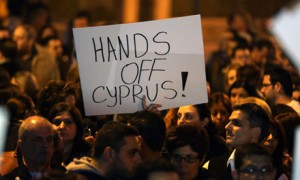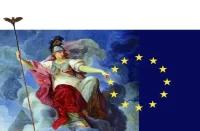The Eurogroup’s decision on financial aid for Cyprus had been taken just one day before the X- hour, late on March 25. Destined to rescue Cyprus, it may become a delayed action mine capable to undermine the whole edifice of the European Union. Laiki Bank, the second largest in Cyprus, is going to be sacrificed. The decision is a reason to sigh with relief for those whose accounts don’t exceed €100 thousand. The story is different for those whose accounts exceed the sum, as well as the bank’s share and bond holders. According to some estimates, the accounts may dwindle by 30-40%. Jeroen Dijsselbloem, the head of the Eurogroup of finance ministers, says the debt restructuring will yield € 4.2 billion, just a little less than the benefit from total deposit tax that had been planned before. European Commissioner for Economy Ollie Rehn said it is a tough decision for the people. Cyprus will get the first tranche of a 10 billion euro international bailout only in early May. It means the threat for the financial system of Cyprus is still imminent; chain reaction may make it spread to other states of Eurozone.
For the second week in a row the world stock exchanges operate looking back on what happens in Cyprus. The first shock, when some indexes went low down to the marks never reached since the summer of 2012, is over. But it’s not the point of return as yet.
Khiem Do, Hong Kong-based head of Asian multi-asset strategy at Baring Asset Management Ltd., said, «I don’t think the selldown on Cyprus issue is overdone. They’re playing a hard bargain and that somehow makes investors nervous». It’s not that easy to make precise who are «they» playing a hard bargain. The Cyprus situation is volatile, different interests are intertwined here. Lars Seier Christensen, co-chief ex-ecutive officer of Danish bank Saxo Bank A/S, calls a spade a spade. According to him, «This is a breach of fundamental property rights, dictated to a small country by foreign powers and it must make every bank depositor in Europe shiver. Although the representatives at the bailout press conference tried to present this as a one-off, they were not willing to rule out similar measures elsewhere – not that it would have mat-tered much as the trust is gone anyway. It is now difficult to expect any kind of limitation to what measures the Troika and EU might take when the crisis really starts to bite». He thinks the EU decision may make money flows flee the troubled countries of Eurozone.
No doubt, the European Union’s leadership, who took the responsibility for the crisis management, is in the focus of ongoing scandal. Its activities had been iffy before, for instance the extremely tough conditions on budget cuts in Greece, though they corresponded to the emergency anti-crisis program demanding the mem-ber states learn to live within their means. The same thing applies to another troubled Mediterranean member state – Portugal. The Euro Commission, the European Central Bank (ECB) and the International Monetary Fund (IMF) inspection team confirmed Portugal failed to meet the required budget parameters. Still, Brussels didn’t demand its bank accounts be frozen or depositors tapped.
It’s an open secret the Euro group’s decision is a result of pressure from Germany.
Till the last moment many in Brussels had not known the details about at least two out of three bills submitted for consideration and destined to present an alternative to deposit tax. From the very start Berlin insisted on cutting down the financial system of Cyprus and participation of creditors in the process of banks restructuring.
There are three players, who have special interest in enticing panic in world stock and currency exchanges; they are well-known stock exchange profit-eer George Soros, the International Monetary Fund and Germany, the country facing general elections in September…
 First about Soros. The Quantum Group of Funds, privately owned hedge funds based in Curaçao (Netherlands Antilles) and Cayman Islands, is notorious for being a financial profiteer. Some reports say, on ‘black Wednesday» , September 16, 1992 Soros made a billion dollar profit taking advantage of British pound sterling’s fall down. He said his success was a result of his theory of reflexivity. Soros believes these perceptions control price trends, domestic government regulation and foreign markets. The decision are taken on the basis of expectations for future, the expectations are a physiological phenomenon that can be influenced.
First about Soros. The Quantum Group of Funds, privately owned hedge funds based in Curaçao (Netherlands Antilles) and Cayman Islands, is notorious for being a financial profiteer. Some reports say, on ‘black Wednesday» , September 16, 1992 Soros made a billion dollar profit taking advantage of British pound sterling’s fall down. He said his success was a result of his theory of reflexivity. Soros believes these perceptions control price trends, domestic government regulation and foreign markets. The decision are taken on the basis of expectations for future, the expectations are a physiological phenomenon that can be influenced.
Concerted information attacks against a currency and simultaneous actions of speculators can shatter financial markets.
He directed his information attacks against euro in recent months. For in-stance, according to his forecast, Germany will pull out of Eurozone, something that is perfectly matching with the growing contradictions between Berlin and the troubled Greece and Cyprus. Capital Economics experts think the currencies of Germany, France, Austria and the Netherlands will appear from nowhere and gain strength by a third. It will create a unique opportunity for multibillion financial speculations. Jackson Wong, a Tanrich Securities investment manager, said, «The Cyprus situation caused quite a stir on global sentiment». It’s good to catch fish in muddy waters.
Another question is Russia and its assets in Cyprus. How would the European Union react if were not for Russian assets, which make up a third of Cyprus’s securi-ties, but, say, the assets belonging to Germany or France? For instance, the last ones are stored in Luxemburg. Could Europeans take the similar decisions if it were Lux-emburg instead of Cyprus?
The scandal is on the rise and makes clearer the dubious role of IMF. Its managing Director Christine Lagarde regularly issues panicky forecasts on Eurozone, no matter the entity she heads is to preserve political and economic stability. Looks like she hints that greater results could be achieved by taking joined concerted efforts led by IMF, including boosting the resources of the Fund itself. By the way, right in the heat of Cyprus crisis the law enforcement agencies of her native France started to pay interest in her activities. Her apartment in Paris has been searched while investigating possible excess of authority in 2008. She was Minister of Economic Affairs, Finances and Industry those days. Now, the experts say, she can face trial on charges of embezzlement and fraud.
Finally, the intensification of Germany’s activities. Berlin is in haste to use the Cyprus situation for its own ends. The coalition of Christian Democratic Union (CDU) and its sister party, the Christian Social Union (CSU), led my Angela Merkel had worked out its own plan on how to rescue Cyprus.
Volker Kauder, Chairman of the CDU/CSU parliamentary group in the Bun-destag, and his deputy Michael Meister say Cyprus should guarantee its participation in the process of providing stability for 6 billion euro state debt.
But the main thing – Cyprus should reshape its economic structure to serve German interests.
Volker Kauder wants Cyprus to restructure its banks, According to him; the country’s banking sector is too large. His view is supported by Norbert Barthle, the Christian Democratic Union’s expert on budget, who says there is no need to pour wa-ter in the sand.
Berlin doesn’t make a secret out of the reasons behind its being tough on re-structuring the banks of Cyprus. It wants to damage Great Britain and Russia, the countries, which have financial interests in the country. It promises nothing good, but financial wars in Europe…
Source: Strategic Culture Foundation














Comments